Sunnahs of Ramadan. The Islamic pillar of fasting is the act of abstaining from food, drink, and marital relations from dawn to dusk in the month of Ramadan. As a Muslim, you already know that Ramadan is the month of blessings and the month of piety – something which has been ingrained in all of us since childhood by our parents or in adulthood by our scholars.
It is the month we all turn to our Lord after eleven months of sins, and hope for His Mercy and Forgiveness. The Qur’an says: “O you who believe! Fasting is prescribed to you as it was prescribed to those before you so that you may attain taqwa (piety).” (Baqarah: 183). This is the month when we all come together as one to devote ourselves to worship. It is the month that the doors of Heaven are opened and the doors of Hell are closed. The reward of every good deed is increased up to 700 times. It is the month of the Night of Power (Laylatul Qadr) which is equal to 1000 months of worship. But all this is stuff you probably already know. But how many of you know how the Prophet SAW spent his Ramadan?
How The Prophet SAW Spent Ramadan
We’ve already talked in our last post about 22 Islamic Quotes on Sunnah Fasting and the special days when the Prophet would fast. But today our focus will be on Ramadan specifically and how the Prophet spent this special month. Fasting is an immense ibadah and a most treasured one to Allah SWT. The Prophet SAW told us that, “(Allah said), ‘Every good deed of Adam’s son is for him except fasting; it is for Me. and I shall reward (the fasting person) for it.’ Verily, the smell of the mouth of a fasting person is better to Allah than the smell of musk.” (Al-Bukhari) And he also told us, “Fasting is a shield with which a servant protects himself from the Fire.” (Ahmad)

With such huge rewards and blessings in store, did we ever stop to think what were the things the Prophet SAW stressed on and what duas he made?
We will run you through some of the essential sunnah of Ramadan that you should know and follow. Use these acts to enhance the quality of your fasts and your worship by following in the footsteps of our beloved Prophet SAW.
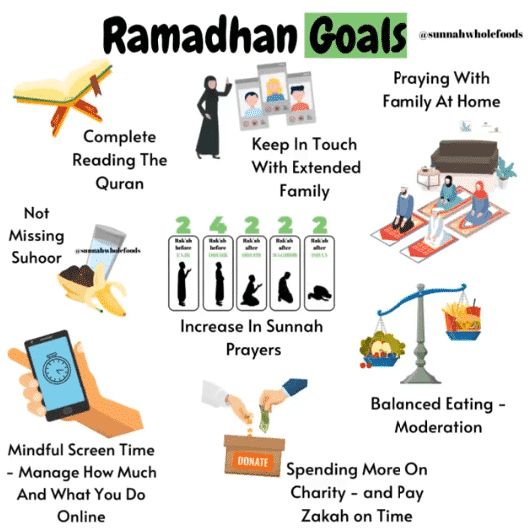
↓ 11. Don’t Skip The Suhoor – The Pre-Dawn Meal
Suhoor is a super sunnah. Many people do not understand how powerful this simple act of eating something before a day of fasting is. The Prophet SAW said, “Take suhoor, for in suhoor there is blessing.” (Al-Nasai).
It can be something as simple as dates and water but you should have something – no matter how little – and not skip this meal because it energizes you throughout the day and helps you retain the strength to focus on your worship. It is preferred to delay suhoor until right before the time for Fajr starts and not too long before.
It is recommended to have whole foods for suhoor so that your body takes longer to digest them and slowly breaks them down to give you boosts of energy at intervals throughout the day. Refined foods are digested immediately and may give you a fuller feeling – but it won’t be for long. You’ll soon feel drained because all the energy from the refined food was released immediately, leaving you with less to last you the day.

↓ 10. Don’t Be Lazy In Having Iftar – The Breaking of the Fast
After a whole day of not eating and drinking for the sake of Allah, Muslims finally sit down for iftar at the time of maghrib. Before breaking your fast, recite this dua: Allahumma laka sumtu wa ala rizqika aftartu (O Allah, for You I fasted, and with Your sustenance I break my fast).
When you have eaten and drank, recite: Dhahabaddamā’u wa’btallatil urooqu wa sabatal ajru inshaAllah (Thirst has been quenched and the veins are moistened, and the reward is guaranteed, if Allah wills). It is preferable to hasten breaking the fast and not delay once the time for maghrib starts.
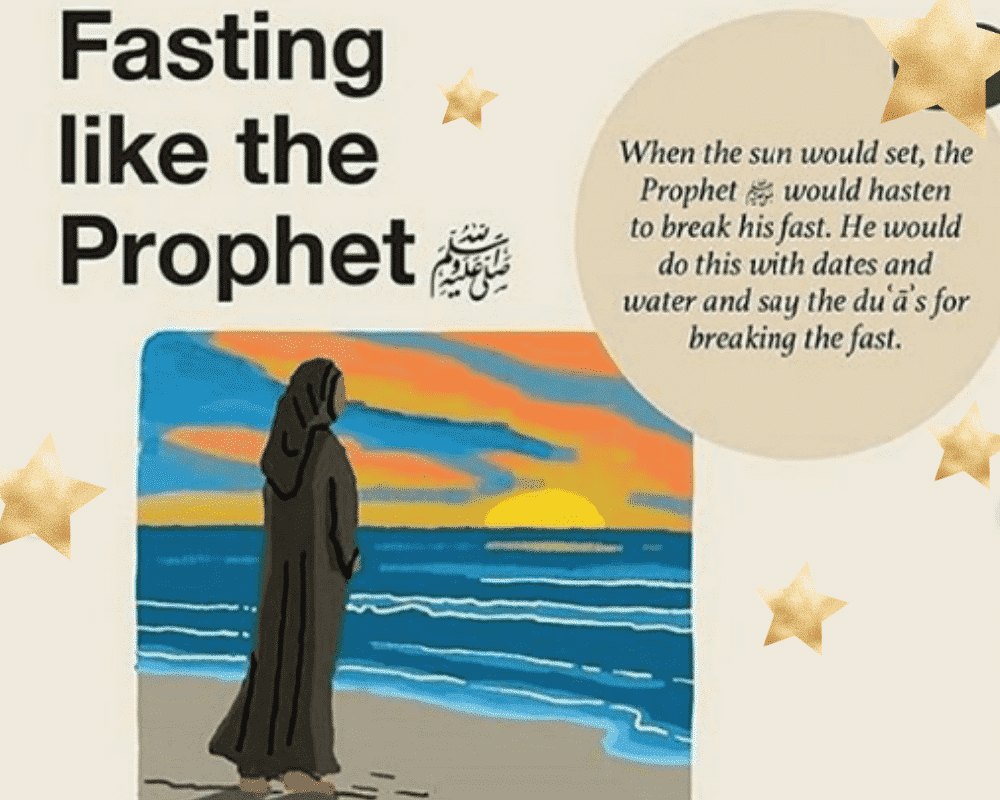
Once you have had something to eat, leave for Maghrib prayer instead of overeating at this time. Once you’re back from prayer, you can have a light dinner to further energize yourself.
Here’s a list of things that the prophet has been reported to have eaten for iftar:
- He would open the fast with fresh or dried dates.
- If dates were not available, he would drink water instead.
- He would also often have a kind of soup that is made by mixing water with Sawiq (a mixture of wheat and barley).
- He did not specially request anything but instead happily ate whatever was available.

Via
↓ 9. Spend Time in Worship & Making Duas
Ramadan is a month of blessings and the month in which thousands of Muslims are released from the Hellfire even if they were destined for it before. That is how the flood of Allah’s Mercy flows in Ramadan. So to attract that gaze of Mercy, we must engage ourselves in worship and not waste these precious moments of multiplied reward and bounty.
Our pious predecessors used to wait all year for Ramadan so that they could attain its special blessings. They used to devote themselves solely to worship and meditation, for the Prophet SAW said, ” A tasbeeh in Ramadan is better than a thousand tasbeehs in other than it.” (Al-Tirmidhi)
Dua is also an act of ibadah, and Allah SWT loves those who ask from Him. Making dua at iftar is like an arrrow that does not miss its target.
Imagine this: a slave of Allah SWT has spent the whole day from dawn to dusk in fulfilling an important pillar of Islam. He is now hungry and thirsty, his body drained of energy, but he is still engrossed in worship, hands raised to His Lord, hopeful of reward. Won’t Allah SWT accept such a prayer? That is why the time right before iftar should be spent in dua, and not in the kitchen. Everyone should facilitate those who prepare iftar in getting done early so that they can also use this precious time to make dua which has high chances of being accepted at that time.
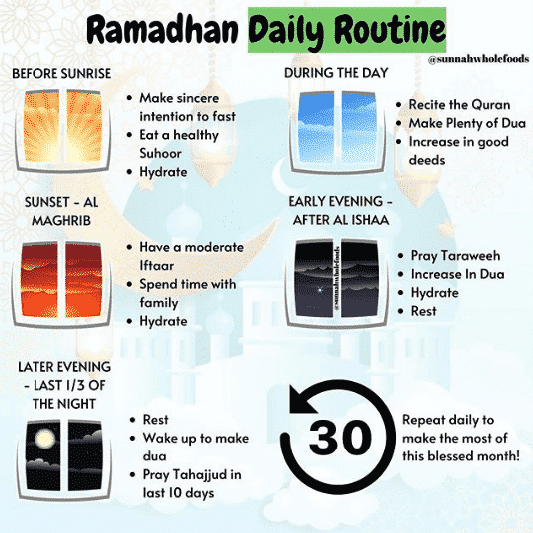
↓ 8. Pray The Night Prayer / Taraweeh
The Prophet SAW said, “Whoever prays during the night in Ramadan out of sincere faith and seeking its reward from Allah, will have all of his previous sins forgiven.” We should try to pray as much as we can, and pay special attention to taraweeh and tahajjud.
Allah SWT’s Mercy is at a peak during Ramadan, and as obedient slaves of our Merciful Lord, we praise Him and worship Him in the way that has been taught to us by the Prophet SAW – and the night time is the best time to do that since there are no distractions, and it is just the slave and his/her Allah. Ayesha RA, the beloved wife of the Prophet SAW, said that he would stand so long in the night prayer, that his feet would swell. When he, the one free from all sin, would spend so long in ibadah, what excuse do we have to skip it?
↓ 7. Refrain from Anger, Foul Language and Bad Manners
While these are acts that should be avoided all year round, be especially mindful of them in Ramadan. Just like the reward for every good deed is multiplied, the consequence of every sin is also multiplied in this sacred month.
The Prophet SAW said, “Fasting is a protection for you, so when you are fasting, do not behave obscenely or foolishly, and if anyone argues with you or abuses you, say, ‘I am fasting. I am fasting’.” (Muwatta Malik) Since the Shayateen are all locked up in this month, it is easier to practice self-control and be more conscious.
After all, fasting is not just about staying hungry for a few hours – it is the practice of piety (taqwa). That is why the Prophet SAW said, “Perhaps a person fasting will receive nothing from his fasting except hunger and thirst.” (Ahmad) This is for the person who said he was fasting but did not honour the sacredness of his fast.

↓ 6. Give Charity
There was no one as generous as the Prophet SAW when it came to charity, especially in Ramadan. The companion, Ibn Abbas, narrated, “The Prophet SAW was the most generous of all the people and he used to become more generous in Ramadan when Gabriel met him. Gabriel used to meet him every night during Ramadan to revise the Qur’an with him. Allah’s Messenger SAW then used to be more generous than the fast wind.” (Al-Bukhari)
Charity not just helps the poor, it also returns back to the giver in a magnified form and protects him/her from evils. It is also reported that one of the people who would get the Shade of Allah SWT on the day of Judgement would be the one who spent so much in charity that his right hand did not know what the left hand had given. We should also try to spend in charity everyday in Ramadan, even if it is half a date, because Allah SWT likes good deeds that are consistent.
↓ 5. How the Prophet SAW Spent the Last 10 Days Of Ramadan/Laylatul Qadar
The last ten nights of Ramadan are extremely important because those are the nights in which one of the odd nights is Laylatul Qadr – the night better than a thousand months. Even though the Prophet SAW was devoted to worship in the month of Ramadan, Ayesha RA said that he would ‘tighten his waist belt’ when the last ten nights approached. This means that he prepared himself for the extra effort.
Here are some things that he used to do in the last ten nights:
- He used to spend the whole night in worship. Of course, he used to eat and drink, too, but the majority of his time was spent in worship.
- He used to wake up his family for worship. As a prophet, he was deeply concerned about his ummah and his family. And we, too, should try to engage and motivate our family members for worship so that they don’t miss out on the tremendous rewards.
- He used to exert himself in worship. Ayesha RA tells us, “The Prophet would exert himself in worship during the last ten nights more than at any other time of the year.” (Al-Muslim). That means that it is sunnah to increase your efforts in worship in the last ten nights.
- He would seek out Laylatul Qadr. And the way to seek it is to engage in worship. We know that it could be any one of the odd nights in the last ten days and we should also spend our time in worship and avoid wasting our time in pointless activities. The Prophet SAW said, “Whoever spends Laylatul Qadr in prayer, believing in Allah and seeking His reward, will be forgiven all of his past sins.” (Al-Bukhari and Al-Muslim) And who wouldn’t want that?
↓ 4. Study The Qur’an
It was customary for the Prophet SAW to revise the Qur’an with Jibraeel AS every Ramadan and the Ramadan before he passed away, he revised it twice. This practice makes it sunnah to complete the recitation of one whole Qur’an in Ramadan and it’s very easy to do! All you have to do is plan beforehand and make a realistic recitation schedule.
The average Qur’an has approximately 600 pages which mean 20 pages per day (given a 30-day Ramadan). If you recite 4 pages after every salah, you can easily complete one whole Qur’an in Ramadan!
But don’t just recite – understand also. The Qur’an was sent as a message and we were meant to decode that message, no matter what our mother tongue is. Ramadan is the month the Qur’an was first revealed and many call it Al-Shahr Ul Qur’an (the Month of Qur’an). We should make it a Ramadan goal to study and understand the meanings and message behind this Holy Book. You should also go through our earlier post on Tips To Complete Recitation Of The Quran This Ramadan.
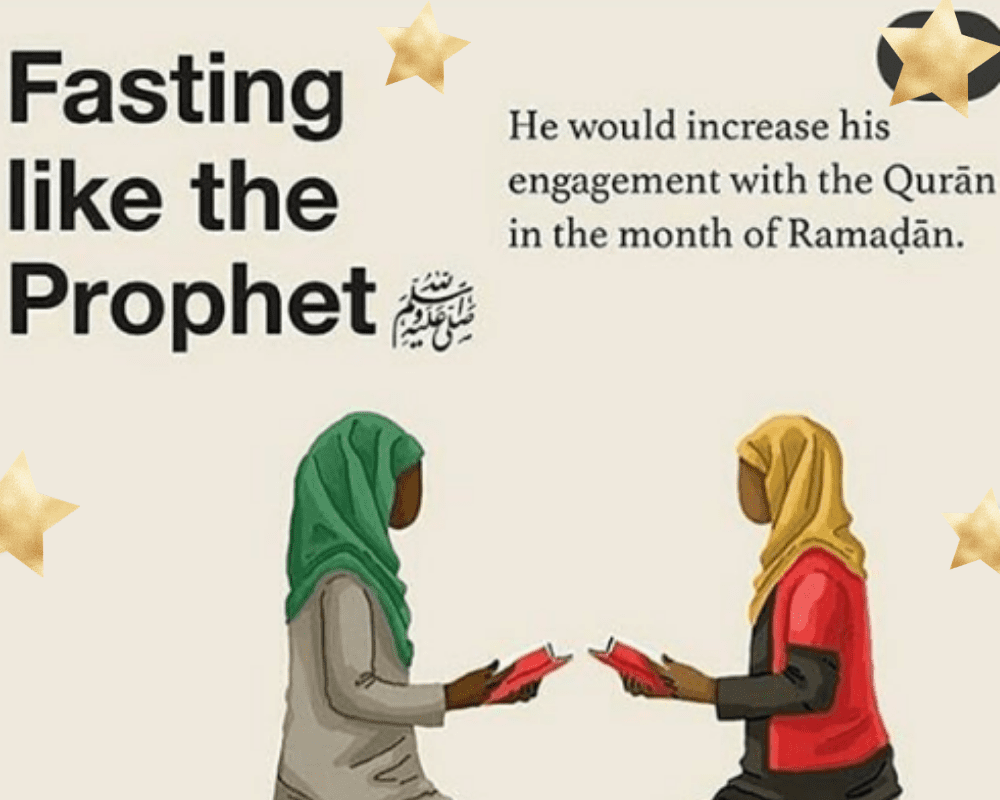
↓ 3. Perform Itekaf
I’tikaf is a sunnah practice that is performed in the last ten days of Ramadan.
Ayesha RA says, “The Prophet used to observe a retreat in the mosque during the last ten nights of Ramadan up until he died. His wives continued to observe this practice after his death.” (Al-Bukhari and Al-Muslim)
For men, i’tikaf is valid only in the mosque and for women, it is preferable that they do it at home. The purpose of this spiritual retreat is to forget about the world and focus only on Allah SWT in an environment that facilitates this purpose. The one performing i’tikaf should not engage in worldly affairs like gossip, and can not leave the area of i’tikaf (except under certain special circumstances).
The one in i’tikaf should engage him/herself in worship, prayer, remembrance, religious counsel (if trained as such), and spend as little time eating, drinking, and engaging in unnecessary talk as possible.
↓ 2. Pray
Many people stay up all night during Ramadan and then sleep the whole day, even at the expense of missing their obligatory prayers! What good is that fast which is not beautified by salah?
Prayer is what stands between a person and disbelief. The Prophet SAW said, “Whoever does not pray asr, his good deeds will be annulled.” (Al-Bukhari)
This hadith specifies asr prayer but is generally about prayer as a whole. No good deed – including fasting – will be accepted without prayer.
The Prophet SAW and his companions used to offer extra prayers in Ramadan and if we can’t manage extra worship, we should at least not skip the obligatory ones. And this includes praying on time and not waking up 5 minutes before the time ends and then offering an extremely half-hearted and rushed salah. Here are Ramadan Duas Complete Collection & Daily Duas For Ramadan.
↓ 1. Share Your Meal
We bet you’ve heard the phrase “sharing is caring”. This is not just a meaningless phrase of two rhyming words, it rings a bell of truth. If you genuinely care about the other person, you would want them to also have what you have.
The Prophet SAW said, “Want for your (Muslim) brother what you want for yourself.” This means that in the spirit of brotherhood and Ramadan, we should also make the effort to share food, no matter how much.
It is a practice in many countries to send distribute iftar amongst neighbours and also amongst the poor to help them break their fast. The Prophet SAW said, “Whoever provides food for a fasting person receives the same reward as [the fasting person], without any [reward] reducing from the one who is fasting.”
This shows us how important the spirit of sharing meals is in Ramadan and why we should make the effort to share our blessings.

We should try our best to make our Ramadan as sunnah-centric as possible and follow closely in the footsteps of the Prophet SAW. Not only will the reward be greater, but the quality of our fasts will also increase. As Muslims, we must make the sunnah and seerah our guiding lights and follow the teachings of the Qur’an to live a life that is fulfilling and rewarding – here, and in the hereafter.

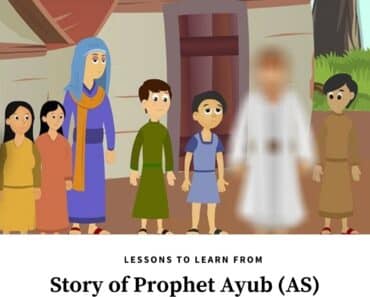
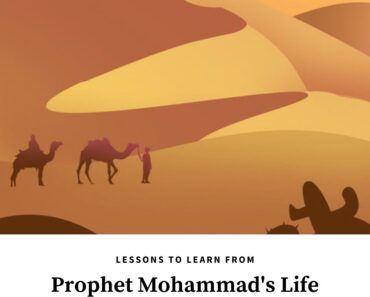




GOOD ARTICLE.
JAZAKUMULLAHU KHAYRAN.
KEEPMUP THE GOOD WORK.
InshaAllah 🙂
I would also request that you visit our Islamic forum to engage in Islamic discussions.
Regards
Team TheIslamicQuotes